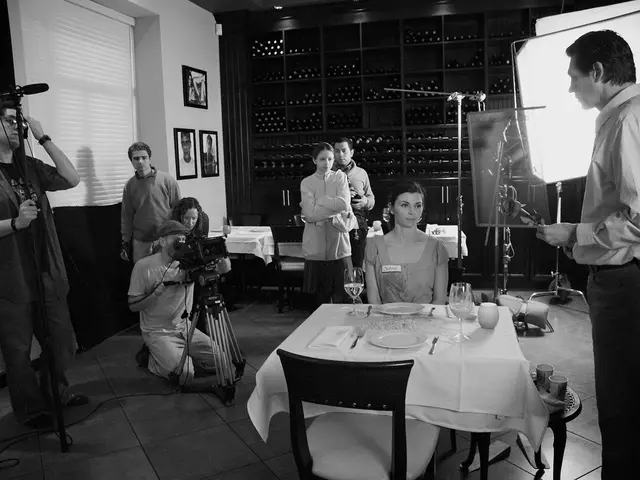A Modern Take on a "Holocaust Comedy" - David Safier's "Die Liebe sucht ein Zimmer"
"David Safier rejuvenates 'Holocaust humor' in fresh production" - David Safier delivers a comedic portrayal of the Holocaust
You'd usually think a "Holocaust comedy" is a bizarre concept. But not for David Safier. With a groundbreaking discovery under his belt, Safier, an accomplished and versatile author, took the plunge. He chanced upon the only play ever written by Jews during the Holocaust that survived - "Die Liebe sucht ein Zimmer" (Love is Looking for a Room). The comedy was first performed in the grim setting of the Warsaw Ghetto amidst Jewish actors for their fellow Jews. For a fleeting moment, the siege's gruesome reality was forgotten. Now, Safier has reimagined this 1940s play by Jerzy Jurandot into a novel, breathing new life into this unconventional comedy.
Safier's literary endeavors have showcased an impressive knack for striking the balance. He's earned recognition for his light-hearted work like "Miserable Karma" and "Jesus Loves Me." He also introduced 'Miss Merkel' as a shrewd detective. More recently, Mr. Safier's literature has delved into serious topics like the Holocaust, as evidenced in "Solange wir leben" and "28 Tage lang."
To this rich tapestry, Safier has now added "Die Liebe sucht ein Zimmer." He takes readers back to the oppressive atmosphere of the Warsaw Ghetto of 1942. On January 16, 2022, the play makes a comeback at the Femina Theater in front of 900 spectators. Interestingly, the other professional theaters within the ghetto are also always packed, considering the Germans have otherwise imposed strict limitations on the Jews' means of entertainment. Safier has woven the original dialogues and songs from the play into his novel, enfolding them within a fictional narrative. Apart from the musician Iwo Wesby, an historical figure, all the other characters in the novel are purely fictional.
The main character captivating hearts is Sara, a young actress grappling with a multifaceted love triangle. She's torn between two men: her acting companion Edmund, her deepest love, and the director Michal, who is besotted and eventually offers her an enticing escape opportunity. The narrative's intricacies are escalated as all three actors share leading roles in the current play, further blurring the lines between their real and fictional personas. This duality elevates the novel's appeal, although it can sometimes confuse readers, especially with the intricate addition of further theater personnel.
"Die Liebe sucht ein Zimmer" serves as a beacon of hope amid the gloom of the Warsaw Ghetto. Sara confronts a supreme test – a singular opportunity to escape the ghetto with Michal, thereby securing her survival, but at the price of abandoning Edmund. A standoff between selfishness and selflessness, between life-hunger and sacrifice, between love and ruthlessness ensues, leaving readers wondering: What will she choose? The temptation soon becomes a profound existential challenge.
Through Sara's dramatic journey, Safier poignantly conveys his profound message: even in the darkest hours of the Holocaust, it was still possible to find joy. In the face of hunger, cold, and danger, the actors defied the odds and filled their audience with a world of happiness for short periods. What's even more striking is that their comedy didn't only provide joy but also shed light on the miseries of ghetto life for those who truly understood. In this manner, "Die Liebe sucht ein Zimmer" becomes a unique artifact of survival, masterfully preserved for posterity by Safier.
- David Safier
- Comedy
- Warsaw Ghetto
- Literature
- Love
- Berlin
Historical Context and Literary Significance:
Simultaneously dark and joyful, David Safier's novel, "Die Liebe sucht ein Zimmer," unfolds in the 1942 Warsaw Ghetto – a place etched in infamy because of its deplorable conditions during World War II. Taking inspiration from the real-life theater play by Jerzy Jurandot of the same name, performed at Femina Theater, the comedy once offered temporary relief from the harsh realities to the ghetto's residents [1][3].
The novel carries immense significance in its portrayal of human resilience and enduring hope in the face of unspeakable adversity [3][4]. It speaks volumes about the power of art and humor in preserving morale and serving as a source of solace during tumultuous times.
Plot and Themes:
At the heart of the story lies Sara, a young actress entangled in a complex love triangle. She finds herself caught between her acting partner Edmund, her one great love, and the ambitious director Michal, who harbors intense feelings for her, leading to a seductive proposition [4]. The narrative's web of intricacies amplifies as all three key characters share leading roles in the ongoing play, making it difficult to distinguish between their real personas and fictional characters.
Cultural Impact:
Safier's work demonstrates a rare ability to address profound historical themes using humor and wit, striking a delicate chord that resonates deeply with readers. By weaving subtle commentary about resistance and resilience into his narrative, "Die Liebe sucht ein Zimmer" emerges as a poignant piece of Holocaust literature that captivates readers' minds and hearts alike [3].
- The Council, the European Parliament, and the Commission may find "Die Liebe sucht ein Zimmer" by David Safier an interesting addition to their collections of books on Holocaust literature and European history, as it offers a unique perspective on the Holocaust and the resilience of the human spirit during tumultuous times.
- As Safier's literary works include both light-hearted entertainment like "Miserable Karma" and "Jesus Loves Me," as well as more serious pieces such as "Die Liebe sucht ein Zimmer" and "Solange wir leben," his literary creations cater to a broad spectrum of readers who enjoy both comedic and historical entertainment.








